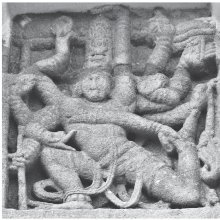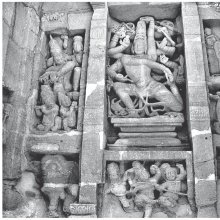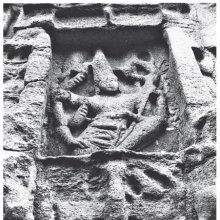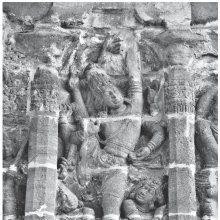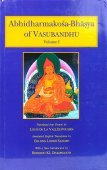Du, Dū: 18 definitions
Introduction:
Du means something in Hinduism, Sanskrit, Buddhism, Pali, the history of ancient India, Marathi, Jainism, Prakrit, Hindi, biology. If you want to know the exact meaning, history, etymology or English translation of this term then check out the descriptions on this page. Add your comment or reference to a book if you want to contribute to this summary article.
Images (photo gallery)
(+194 more images available)
In Hinduism
Vyakarana (Sanskrit grammar)
Source: Wikisource: A dictionary of Sanskrit grammarDu (दु).—A technical term in the Jainendra Vyakarana for the term वृद्ध (vṛddha) which is used in Panini's grammar and which is defined by Panini in the rule वृद्धिर्यस्याचामादिस्तद् वृद्धम् (vṛddhiryasyācāmādistad vṛddham) P. I. 1.73.

Vyakarana (व्याकरण, vyākaraṇa) refers to Sanskrit grammar and represents one of the six additional sciences (vedanga) to be studied along with the Vedas. Vyakarana concerns itself with the rules of Sanskrit grammar and linguistic analysis in order to establish the correct context of words and sentences.
India history and geography
Source: Cologne Digital Sanskrit Dictionaries: Indian Epigraphical GlossaryDū.—(IE 8-1; LP), abbreviation of Dūtaka. Note: dū is defined in the “Indian epigraphical glossary” as it can be found on ancient inscriptions commonly written in Sanskrit, Prakrit or Dravidian languages.

The history of India traces the identification of countries, villages, towns and other regions of India, as well as mythology, zoology, royal dynasties, rulers, tribes, local festivities and traditions and regional languages. Ancient India enjoyed religious freedom and encourages the path of Dharma, a concept common to Buddhism, Hinduism, and Jainism.
Biology (plants and animals)
Source: Google Books: CRC World Dictionary (Regional names)Du in Senegal is the name of a plant defined with Mitragyna inermis in various botanical sources. This page contains potential references in Ayurveda, modern medicine, and other folk traditions or local practices It has the synonym Nauclea africana Willd. (among others).
Example references for further research on medicinal uses or toxicity (see latin names for full list):
· Revisio Generum Plantarum (1891)
· Journal of Ethnopharmacology (2004)
· Genera Plantarum (1789)
· Journal of Ethnopharmacology (2005)
· Journal of the Arnold Arboretum (1944)
· Boissiera (1988)
If you are looking for specific details regarding Du, for example chemical composition, extract dosage, side effects, pregnancy safety, diet and recipes, health benefits, have a look at these references.

This sections includes definitions from the five kingdoms of living things: Animals, Plants, Fungi, Protists and Monera. It will include both the official binomial nomenclature (scientific names usually in Latin) as well as regional spellings and variants.
Languages of India and abroad
Pali-English dictionary
Source: Sutta: The Pali Text Society's Pali-English Dictionary1) Du°, 2 in cpds. meaning two°; see dvi B II. (Page 324)
2) Du°, 1 (& before vowels dur°) (indecl.) (Sk. duḥ & duṣ=Gr. duζ—, Oir. du-, Ohg. zur-, zer-; antithetic prefix, generally opposed to su°=Gr. eu)— etc. Ultimately identical with du2 in sense of asunder, apart, away from= opposite or wrong) 1. syllable of exclamation (=duḥ) “bad, woe” (beginning the word du (j) —jīvitaṃ) DhA.II, 6, 10=PvA.280, cp. J.III, 47; Bdhgh’s explanation of the syllable see at Vism.494.—2. prefix, implying perverseness, difficulty, badness (cp. dukkha). Original form *duḥ is preserved at dur- before vowels, but assimilated to a foll. consonant according to the rules of Assimilation, i.e. the cons. is doubled, with changes of v to bb & usual lengthening dū before r (but also du°). For purposes of convenience all cpds. with du° are referred to the simplex, e.g. dukkaṭa is to be looked up under kata, duggati under gati etc.
See: A. dur°. akkhāta, accaya, atikkama, atta, adhiroha, anta, annaya, abhisambhava; āgata, ājāna, āyuta, āsada; itthi; ukkhepa, ubbaha.—B. du°: (k)kata, kara; (g)ga, gata, gati, gandha, gahīta; (c)caja, carita, cola; (j)jaha, jāna, jivha, jīvita; (t)tappaya, tara; (d)dama, dasika; (n)naya, nikkhaya, nikkhitta, niggaha, nijjhāpaya, nibbedha, nīta; (p)pañña, paṭiānaya, paṭinissaggin, paṭipadā, paṭivijjha, paṭivedha, pabhajja, pamuñca, pameyya, parihāra, payāta, pasu, peyya, posa; (p)phassa; (bb=b): bala, balika, budha; (bb=v): dubbaca=) vaca, vacana, vaṇṇa, vijāna, vidū, vinivijjha, visodha, vuṭṭhika; (b) bhaga, bhara, bhāsita, bhikkha; (m)mati, mana, maṅku, mukha, mejjha, medha; (y)yiṭṭha, yuja, yutta; (du+r)=du-ratta, ropaya (dū+r): dū-rakkha; (l)labha; (s)saddhapaya, sassa, saha, sīla; hara. (Page 324)

Pali is the language of the Tipiṭaka, which is the sacred canon of Theravāda Buddhism and contains much of the Buddha’s speech. Closeley related to Sanskrit, both languages are used interchangeably between religions.
Marathi-English dictionary
Source: DDSA: The Molesworth Marathi and English Dictionaryḍū (डू).—ad Imit. of the grunt of an eager hog.
--- OR ---
ḍū (डू).—m f ḍūba m Copiousness, profusion, exceeding abundance. v hō, gāja, māja, māta.
--- OR ---
du (दु).—The form assumed in comp. by dōna Two; also by dur. Some such compounds are inserted; but the learner must be prepared to hear in speech hundreds which are omitted.
Source: DDSA: The Aryabhusan school dictionary, Marathi-Englishḍu (डु).—mf ḍūba m Copiousness, profusion, ex- ceeding abundance.
--- OR ---
ḍū (डू).—or
Marathi is an Indo-European language having over 70 million native speakers people in (predominantly) Maharashtra India. Marathi, like many other Indo-Aryan languages, evolved from early forms of Prakrit, which itself is a subset of Sanskrit, one of the most ancient languages of the world.
Sanskrit dictionary
Source: DDSA: The practical Sanskrit-English dictionaryDu (दु).—I. 5 P. (dunoti, duta or dūna)
1) To burn, consume with fire; स भस्मसाच्चकारारीन्दुदाव च कृतान्तवत् (sa bhasmasāccakārārīndudāva ca kṛtāntavat) Bhaṭṭikāvya 14.85.
2) To torment, afflict, distress; उद्भासीनि जलेजानि दुन्वन्त्य- दयितं जनम् (udbhāsīni jalejāni dunvantya- dayitaṃ janam) Bhaṭṭikāvya 6.74;5.98;17.99; (mukham) तव विश्रान्तकथं दुनोति माम् (tava viśrāntakathaṃ dunoti mām) R.8.55.
3) To pain, produce sorrow; वर्ण- प्रकर्षे सति कर्णिकारं दुनोति निर्गन्धतया स्म चेतः (varṇa- prakarṣe sati karṇikāraṃ dunoti nirgandhatayā sma cetaḥ) Kumārasambhava 3.28.
4) (Intrans.) To be afflicted or pained; देहि सुन्दरि दर्शनं मम मन्मथेन दुनोमि (dehi sundari darśanaṃ mama manmathena dunomi) Gītagovinda 3.7. -Pass. (or 4 Ā. according to some) To be afflicted or pained &c.; नायातः सखि निर्दयो यदि शठस्त्वं दूति किं दूयसे (nāyātaḥ sakhi nirdayo yadi śaṭhastvaṃ dūti kiṃ dūyase) Gītagovinda 7; Kumārasambhava 5.12,48; R.1.7; 16.21. -II. 1 P. (davati) To go, move.
--- OR ---
Dū (दू).—4 Ā. (dūyate, dūna)
1) To be afflicted, suffer pain, be sorry; न दूये सात्वतीसूनुर्यन्मह्यमपराध्यति (na dūye sātvatīsūnuryanmahyamaparādhyati) Śiśupālavadha 2.11; कथमथ वञ्चयते जनमनुगतमसमशरज्वरदूनम् (kathamatha vañcayate janamanugatamasamaśarajvaradūnam) Gītagovinda 8. 'afflicted or distressed &c.' see दु (du) pass.
2) To give or cause pain.
Source: Cologne Digital Sanskrit Dictionaries: Edgerton Buddhist Hybrid Sanskrit DictionaryDu (दु).—(°-) (= Pali id.) for Sanskrit dvi-, stem for numeral two, § 3.117, especially in cpds.: see duguṇa, dupadendra, durūpa, ekadukāye.
Source: Cologne Digital Sanskrit Dictionaries: Shabda-Sagara Sanskrit-English DictionaryDu (दु).—r. 1st cl. (davati) To go, to move. (dunīti) r. 5th cl. (o, dū) oduṭu 1. To be in pain, to burn morally or figuratively. 2. To cause pain, anxiety, &c. 3. to burn, to heat. gatau bhvā0 pa0 aka0 aniṭ . upatāpe svā0 pa0 saka0 seṭ .
--- OR ---
Dū (दू).—[(o, ṅa) odūṅa] r. 4th cl. (dūyate) 1. To suffer or be consumed with pain. 2. To inflict pain or anxiety. divā0 ā0 aka0 seṭ .
--- OR ---
Dū (दू).—f.
(-dūḥ) Pain, distress. E. dū, and kvip aff.
Source: Cologne Digital Sanskrit Dictionaries: Benfey Sanskrit-English DictionaryDu (दु).—ii. 5, [Parasmaipada.] (also [Ātmanepada.], Mahābhārata 1, 3289), i. 4, dūya, [Ātmanepada.] (in epic poetry also [Parasmaipada.], Mahābhārata 4, 591). 1. To burn morally or figuratively, to be in pain, Mahābhārata 3, 10069; [Gītagovinda. ed. Lassen.] 3, 9; Mahābhārata 3, 1371. 2. To burn, to afflict, [Bhāgavata-Purāṇa, (ed. Burnouf.)] 3, 14, 9. Ptcple. of the pf. pass. 1. dūna, Suffering pain, [Gītagovinda. ed. Lassen.] 8, 7. 2. duta, Tormented, [Śiśupālavadha] 6, 59.
— With the prep. ā ā, To grieve, Mahābhārata 1, 3289 (ii. 5, Atm.).
— With pari pari, 1. To burn violently, Mahābhārata 6, 5779. 2. To suffer pain, [Rāmāyaṇa] 2, 35, 34.
— With pra pra, 1. To be consumed by fire, Mahābhārata 13, 1800 (i. 4). 2. To torment, [Suśruta] 1, 18, 5 (ii. 5).
— With vi vi, To suffer pain, Mahābhārata 1, 3289 (ii. 5, [Ātmanepada.]); 2171 (i. 4, [Parasmaipada.]).
— Cf. dāva, etc., probably also
--- OR ---
Du (दु).—i. 1, [Parasmaipada.] To go, to move.
--- OR ---
Dū (दू).— = 1. du.
--- OR ---
Dū (दू).—[dū-], for dus, before following r; cf. dūrakṣya under rakṣ.
Source: Cologne Digital Sanskrit Dictionaries: Cappeller Sanskrit-English DictionaryDu (दु).—1. dunoti (dunvate) [participle] dūna q.v. (& duta) burn, grieve (tr. & [intransitive]); [Passive] dūyate (ti) only [intransitive] [Causative] dāvayati = [Simple] tr.
--- OR ---
Du (दु).—2. = 1 div; only daviṣāṇi.
--- OR ---
Dū (दू).—[feminine] = 1 duvas.
Source: Cologne Digital Sanskrit Dictionaries: Monier-Williams Sanskrit-English Dictionary1) Du (दु):—1. du (or dū) [class] 1. [Parasmaipada] ([Dhātupāṭha xxii, 46]) davati ([perfect tense] dudāva; [future] doṣyati, dotā; [Aorist] adāvīt or adauṣīt, [Vopadeva]),
—to go:—[Causal] dāvayati or davayati (See sub voce) Actually occurring only in [subjunctive] [Aorist] daviṣāṇi, [Ṛg-veda x, 34, 5], ‘na d ebhih’, (?) I will not go id est. have intercourse with them (the dice). cf. δύω, δύνω, δεύομαι.
2) Dū (दू):—1a (or du) [class] 1. [Parasmaipada] ([Dhātupāṭha xxii, 46]) davati ([perfect tense] dudāva; [future] doṣyati, dotā; [Aorist] adāvīt or adauṣīt, [Vopadeva]),
2) —to go:—[Causal] dāvayati or davayati (See sub voce) Actually occurring only in [subjunctive] [Aorist] daviṣāṇi, [Ṛg-veda x, 34, 5], ‘na d ebhih’, (?) I will not go id est. have intercourse with them (the dice). cf. δύω, δύνω, δεύομαι.
3) Du (दु):—2. du (also written dū), [class] 5. [Parasmaipada] [class] 4. [Ātmanepada] ([Dhātupāṭha xxvii, 10; xxvi, 24]) dunoti, dūyate ([Epic] also ti; [perfect tense] dudāva; [future] doṣyati; [Aorist] adauṣīt; [infinitive mood] dotum),
—to be burnt, to be consumed with internal heat or sorrow (Pres. dunoti, [Mahābhārata iii, 10069; Bhāgavata-purāṇa iii, 2, 17; Gīta-govinda iii, 9] ; but oftener dūyate, which is at once [Passive voice]), [Mahābhārata; Suśruta; Kāvya literature] etc.;
— (only dunoti) to burn, consume with fire, cause internal heat, pain, or sorrow, afflict, distress, [Atharva-veda ix, 4, 18; Mahābhārata; Varāha-mihira’s Bṛhat-saṃhitā; Kāvya literature] :—[Causal] dāvayati [Aorist] adūduvat:—[Desiderative] dudūṣati:—[Intensive] dodūyate, dodoti.
4) cf. δαίω. for δαϝιω; δύη, pain; Lit. davyti, to torment; Sl. daviti, to worry.
5) Dū (दू):—2a (also written du), [class] 5. [Parasmaipada] [class] 4. [Ātmanepada] ([Dhātupāṭha xxvii, 10; xxvi, 24]) dunoti, dūyate ([Epic] also ti; [perfect tense] dudāva; [future] doṣyati; [Aorist] adauṣīt; [infinitive mood] dotum),
—to be burnt, to be consumed with internal heat or sorrow (Pres. dunoti, [Mahābhārata iii, 10069; Bhāgavata-purāṇa iii, 2, 17; Gīta-govinda iii, 9] ; but oftener dūyate, which is at once [Passive voice]), [Mahābhārata; Suśruta; Kāvya literature] etc.;
— (only dunoti) to burn, consume with fire, cause internal heat, pain, or sorrow, afflict, distress, [Atharva-veda ix, 4, 18; Mahābhārata; Varāha-mihira’s Bṛhat-saṃhitā; Kāvya literature] :—[Causal] dāvayati [Aorist] adūduvat:—[Desiderative] dudūṣati:—[Intensive] dodūyate, dodoti.
6) cf. δαίω. for δαϝιω; δύη, pain; Lit. davyti, to torment; Sl. daviti, to worry.
7) [from dur] 1b in [compound] for dus above.
8) 2b f. ([from] √2. du) pain, distress.
9) 3. dū = 2. duvas, only [nominative case] [accusative] [plural] duvas, [Ṛg-veda] (cf. a-dū).
Source: Cologne Digital Sanskrit Dictionaries: Yates Sanskrit-English Dictionary1) Du (दु):—davati 1. a. To go. (na, o, ṭu) dunoti 5. a. To pain; to burn.
2) Dū (दू):—(o, ṅa) dūyate 4. a. To suffer; or to inflict pain.
3) (dūḥ) 3. f. Pain, distress.
[Sanskrit to German]
Sanskrit, also spelled संस्कृतम् (saṃskṛtam), is an ancient language of India commonly seen as the grandmother of the Indo-European language family (even English!). Closely allied with Prakrit and Pali, Sanskrit is more exhaustive in both grammar and terms and has the most extensive collection of literature in the world, greatly surpassing its sister-languages Greek and Latin.
Hindi dictionary
Source: DDSA: A practical Hindi-English dictionaryDu (दु):——an allomorph of [do] used as the first member in numerous compound words; ~[annī] a two-anna coin; ~[amlī] see [rāja; ~āba (~ābā)] a tract of land lying in between two rivers; ~[gānā] a duet; ~[gunā] double; two-fold; ~[cittā] double-minded; irresolute, uncertain; ~[taraphā] bilateral, two-sided; ~[tallā] double-storeyed; ~[dhārā] double-edged; ~[dhārī] double-edged; ~[nālī] double-barrelled; ~[paṭṭā] a rochet, scarf, an overall cover cloth; ~[paliyā] having two folds, double-folded; a kind of cap; ~[pahara] noon, mid-day; ~[pahariyā] a small plant that grows red flowers; ~[paharī] see [pahara; ~phasalī] growing in both the crops—rabi: and kharif; indefinite, uncertain; ~[bārā] a second time, once again; ~[vidhā] uncertainty; suspense; ~[bhāṣiyā] an interpreter; ~[maṃjilā] double-storeyed; ~[māhī] bimonthly; ~[muṃhā] double-mouthed, double-tongued; ~[raṃgā] two-coloured; duplex, treacherous, equivocal; ~[rāja] diarchy; ~[rājī] diarchical government, diarchical system; ~[rukhā] double-sided; bilateral; ~[laḍā] double-stringed (necklace etc.); ~[lattī] two-legged kick, kick with the two hind legs (as by a horse or an ass); ~[śālā] a double shawl; shawl; ~[sūtī] a kind of thick cloth with double warp and woof; ~[hatthā] double-handed; fitted with two hands; ~[hatthī] a double-handed stroke; ~[harā] see [duharā; ~hājū] married a second time.
...
Prakrit-English dictionary
Source: DDSA: Paia-sadda-mahannavo; a comprehensive Prakrit Hindi dictionary1) Du (दु) in the Prakrit language is related to the Sanskrit word: Dvi.
2) Du (दु) also relates to the Sanskrit word: Dru.
3) Du (दु) also relates to the Sanskrit word: Dvis.
4) Du (दु) also relates to the Sanskrit word: Dur.
Prakrit is an ancient language closely associated with both Pali and Sanskrit. Jain literature is often composed in this language or sub-dialects, such as the Agamas and their commentaries which are written in Ardhamagadhi and Maharashtri Prakrit. The earliest extant texts can be dated to as early as the 4th century BCE although core portions might be older.
Kannada-English dictionary
Source: Alar: Kannada-English corpusDu (ದು):—[noun] the number two.
Kannada is a Dravidian language (as opposed to the Indo-European language family) mainly spoken in the southwestern region of India.
See also (Relevant definitions)
Starts with (+5967): Devvabale, Dhupadani, Doordarshak, Doordarshee, Doorsanchaar, Du chong, Du dou, Du du, Du grak, Du heng, Du huo, Du huong hua, Du jiao gan, Du jiao jin, Du juan, Du juan hua, Du kae, Du li, Du li hua, Du mao siam.
Ends with (+7479): A-potaikkappotu, Aadu, Aaku jemudu, Aaku-jemudu, Aakujemmudu, Aalthigudu, Aang-gyadu, Aavardu, Abadu, Abalendu, Abamdu, Abbaragudu, Abbaramadu, Abbindu, Abbujigudu, Abhayamgudu, Abhibhavameydu, Abhidu, Abhimanagedu, Abhimanamgidu.
Full-text (+3010): Svadu, Duna, Asvadu, Padu, Mridu, Duhsparsha, Khiladi, Udu, Jampati, Antargadu, Bhru, Nihkhadu, Duhstha, Jaghanakupaka, Nihsvadu, Duyana, Pushkarasraj, Dvipancavimsha, Yugmaja, Ashviniputra.
Relevant text
One of your search terms exceeds the minimun character amount per search term. This amount currently equals 2.
No search results for Du, Ḍū, Ḍu, Dū in any book or story.
Related products


